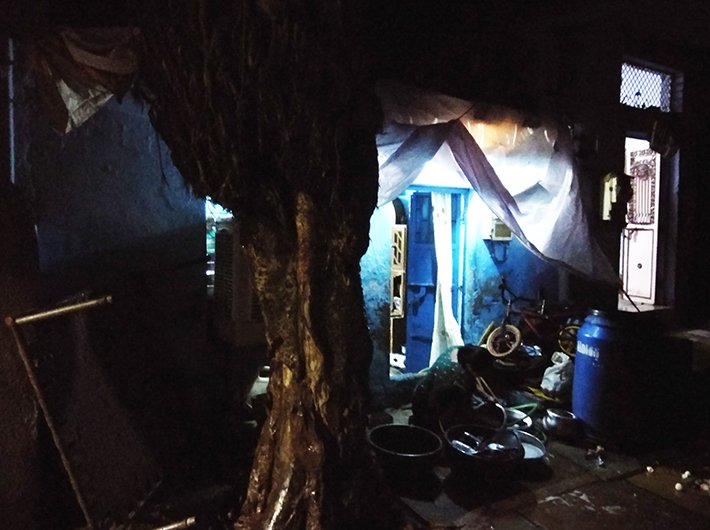In Ahmedabad, any mention of this locality elicits quite a reaction. “There’s no point in going there. It’s been 15 years now. It’s all developed!” And I’d be tempted to buy into their assumption too. After all, it’s this development of the state of Gujarat that has succeeded in making development synonymous with the brand Narendra Modi. That helped the BJP win three assembly polls and maybe fourth as well. The development is visible too – for example, in the smooth and seemingly sturdy boulevards running between Ahmedabad and the capital city of Gandhinagar. However, as I move towards Naroda Patiya, an Achilles’ heel in the city’s recent history, it becomes a bumpy ride.
After the Godhra train-burning carnage of February 2002, Gulbarg Society and Naroda Patiya were the first to bear the brunt of retaliatory attacks on Muslims in Ahmedabad. Official figures say that the Naroda Patiya massacre claimed 97 lives. There were a number of incidents of sexual assault and gang-rape, with 36 women and 35 children being killed. The state government was widely blamed for doing little to control the mobs.
Fifteen long years have passed since then, and the state of Gujarat continues to be a bastion of the BJP, which is also in power at the centre since 2014. The then Gujarat CM Modi has made his way to the 7, Lok Kalyan Marg (as the PM’s residence is now known) in New Delhi. Ahmedabad’s image has been transformed into that of an industry-friendly and one of the fastest developing cities in the country, while only a few remember it as a helpless spectator of the 2002 riots. But, what has changed for Naroda Patiya?
Well, a little has. The Sunni Nurani Masjid, an important landmark from the Muslim-dominated area, now overlooks a BRTS track and the Naroda Patiya police chowki across the road. Right next to the mosque is a scanty tea shop, owned by one Mr Dabade. (When I visited the place in August, the service road between his shop and the ramshackle footpath was flooded with water and sludge as a result of incessant downpour of the day. But that did not drown Dabade’s faith in the promise of development.)
Dabade, a Marathi in his forties, is all praises for Modiji. He fills one of the tiny paper cups with tea for himself, steps out of the shop to sit next to me, and says, “I believe, Modiji is still our chief minister. It’s just that now he’s ruling from the post of the prime minister. He still has total control over Gujarat, and the public is very aware of that.”
He is confident that BJP will put up a stellar performance in the upcoming assembly elections and there is no scope for any other political party in Gujarat. “No, not even Hardik Patel! They just want to do ‘politics’. We vote for real work now, and no one else has ever done that as efficiently as Modiji has done. Have you seen what the Congress and that [Sharad] Pawar have done to your Maharashtra? Why would anyone vote for them anymore?” he questions.
Dabade, who had moved to Gujarat with his family in the early eighties, claims that he saw what happened in the 2002 riots, but refuses to speak about it. He goes on to applaud the PM and reiterates what we’ve heard before – it’s been a long time; all is well now – before returning to his counter. His neighbour in a pathani kurta and a netted skullcap continues repairing a scooter in front of his mechanic shop, while he stoically listens to Dabade. As I try to approach him, he gets up without looking at me, and moves away.
Maulana Nafis Alam from the Sunni Nurani Masjid reluctantly guides me to Yasin Bhai, a member of the Islamic Relief Committee of Gujarat (IRCG). The committee has been credited for the majority of rehabilitation work in Naroda Patiya, including repair and partial reconstruction of the mosque and houses of Muslims that were burnt down in 2002.
Yasin Bhai runs a mobile repair shop in the Hukum Singh chawl across the mosque. He accompanies me to the colony behind his shop. He says, “It has never been the same for us after 2002. Yes, 15 years is a long time, but we’re constantly reminded of the fact that we’re Muslims first, and no one can guarantee absolute safety for us. Look at what they did to [lynching victim] Junaid – just because he was a Muslim. Muslims here are scared even today. No doubt about that.”
As a few residents of the colony join in the discussion, one of them quips, “The day the verdict of the Babri masjid case was expected, our colony was totally deserted. Everyone took refuge at some relatives’ or friends’ place for a day or two. We came back only after ensuring that there was no threat to our lives.” He adds that this practice is routine. Every time there is an incident anywhere in the country that can possibly spark communal violence, the Muslims of Naroda Patiya find themselves evacuating their colonies.
As I proceed to see Nazir Khan Pathan, a senior member of the committee and the community, at his place, I cross several grimy lanes bordered by haphazardly built houses sharing their walls with each other. The road is pothole-ridden, covered with broken tiles at places, and dotted with piles of garbage. Malik Bilawar, another local who accompanies me, complains that the city administration hardly ever bothers to pick up the garbage from the colony. “And they are selling their development outside. Do you see any here?” he asks.
On the way, I see a woman, Rukhsana, scrubbing a vessel outside her house. Rukhsana lost her mother and sister in the 2002 riots. “I don’t care for any government, any party. All of them are alike, no one is going to help us,” she says. She tells me that the convicts, when they are out on parole, still come back to threaten her, fight with her. “They had attacked my husband too. We have just filed a petition in the high court in this regard. We’re still living in the same hell,” she says.
Pathan is the principal of the Iqra Primary School in Jawannagar. As Bilawar introduces me to him, he clears the settee closest to the ceiling fan for me and looks for his spectacles, while he sends Bilawar to the kitchen to take care of cooking. Pathan has a lot of stories to tell, including the one about the rape and murder of Kausar Bano. Pathan hid himself in a water tank for hours with just his head above the water level on the day the massacre started, he says. He points to the patterns on his walls and ceiling, which are old burns, now covered in white and pink distemper.
“BJP’s ideology is communal,” says Pathan. “They’re in power, and they want to retain the power. That is why it looks like all is well. But in reality, the ash on the surface is hiding the embers.” Pathan feels there is hatred for the Muslims in the country today. “A beard has become a symbol of terrorism,” he says. And in Gujarat, the Muslims have no political options. Pathan feels that the Congress hasn’t done enough, or helped the riot victims in their struggle for justice. Pathan was briefly hopeful about Hardik Patel, but he has come to believe that the young leader doesn’t stick to what he says. “He had gathered a good number of followers. He should have utilised it properly. For the upcoming elections, it looks like there is no alternative available [to us]. Their [BJP’s] tactics are working on the people of the county. They will most likely retain the power in the state as well.”

